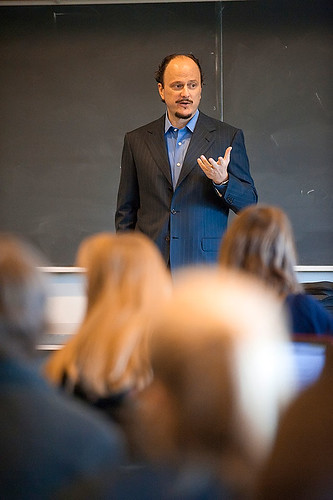On Thursday, students who have been studying a Pulitzer Prize-winning novel got to hear straight from the horse’s mouth just what it took to write it — and ask him detailed questions about what intrigued, confused, or enlightened them in their reading of his book.
Jeffrey Eugenides, author of Middlesex, spent 75 minutes with the students in the Living Writers course in conversation about the art and craft of writing.
Clad in a dark blue Italian pinstriped suit, and pacing the front of the Ho Lecture Room, Eugenides shared details, sometimes mechanical, sometimes almost confessional in nature, in answer to questions about his intentions, process, and struggles in researching and writing what he calls a “comic mock epic” story, told by the hermaphroditic Calliope Stephanides.
Danielle Smith ’09, an MAT student, commented on the book’s unconventional narrative style, in which Cal could be speaking both in the first person and as an omniscient narrator.
 |
| Jeffrey Eugenides speaks to students in the Living Writers course on Thursday. (Photo by Andy Daddio) (Photo by Andy Daddio) |
“I was going through and saying, this isn’t fair, he can’t have known this and that. But I liked the way it worked. Do you think that writers block themselves in with conventions like that, and could they make better literature if they let themselves skirt the rules?” she asked.
Although it wasn’t something he’d do often, Eugenides explained, “It takes a long time to find the right point of view. I didn’t blithely violate the rules, but I found that the existing rules were not allowing me to tell the story. That has a lot to do with the character of Cal. It seemed to me that somebody who ended up with a genetic mutation that so affected his life, his need to explain himself might cause him to overflow the confines of his own ego . . . Once I realized that, I gave myself permission.”
The students peppered Eugenides with questions about everything from his use of method acting to understand his main character, to his choice of names and his intentions regarding social commentary, to the decisions he made about structure, plot, structure, detail, and research.
Eugenides then spent another hour giving a public talk and answering questions about how he wrote the book, in front of an expanded audience that included the class, members of the community, and alumni, parents, and others who listened to a . His public appearance was co-sponsored by the Institute for Creative and Performing Arts.
Professors Jane Pinchin and Jennifer Brice resurrected the Living Writers course and reading series, originally created by the late English Professor Frederick Busch, and last taught by him in 2001 before he retired.
“Fred’s idea was wonderful,” said Pinchin, “We have lots of speakers come to campus, but it works best when their visits are attached to classes — it’s a different thing when you study the books with the people who wrote them.”